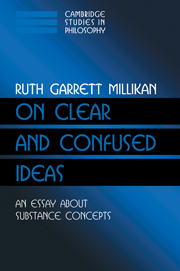Book contents
- Frontmatter
- Contents
- Preface
- Chapter 1 Introducing Substance Concepts
- Chapter 2 Substances: The Ontology
- Chapter 3 Classifying, Identifying, and the Function of Substance Concepts
- Chapter 4 The Nature of Abilities: How Is Extension Determined?
- Chapter 5 More Mama, More Milk and More Mouse: The Structure and Development of Substance Concepts
- Chapter 6 Substance Concepts Through Language: Knowing the Meanings of Words
- Chapter 7 How We Make Our Ideas Clear: Epistemology for Empirical Concepts
- Chapter 8 Content and Vehicle in Perception
- Chapter 9 Sames Versus Sameness in Conceptual Contents and Vehicles
- Chapter 10 Grasping Sameness
- Chapter 11 In Search of Strawsonian Modes of Presentation
- Chapter 12 Rejecting Identity Judgments and Fregean Modes
- Chapter 13 Knowing What I'm Thinking Of
- Chapter 14 How Extensions of New Substance Concepts are Fixed: How Substance Concepts Acquire Intentionality
- Chapter 15 Cognitive Luck: Substance Concepts in an Evolutionary Frame
- Appendix A Contrast with Evans on Information-Based Thoughts
- Appendix B What Has Natural Information to Do with Intentional Representation?
- References
- Index
Chapter 13 - Knowing What I'm Thinking Of
Published online by Cambridge University Press: 02 December 2009
- Frontmatter
- Contents
- Preface
- Chapter 1 Introducing Substance Concepts
- Chapter 2 Substances: The Ontology
- Chapter 3 Classifying, Identifying, and the Function of Substance Concepts
- Chapter 4 The Nature of Abilities: How Is Extension Determined?
- Chapter 5 More Mama, More Milk and More Mouse: The Structure and Development of Substance Concepts
- Chapter 6 Substance Concepts Through Language: Knowing the Meanings of Words
- Chapter 7 How We Make Our Ideas Clear: Epistemology for Empirical Concepts
- Chapter 8 Content and Vehicle in Perception
- Chapter 9 Sames Versus Sameness in Conceptual Contents and Vehicles
- Chapter 10 Grasping Sameness
- Chapter 11 In Search of Strawsonian Modes of Presentation
- Chapter 12 Rejecting Identity Judgments and Fregean Modes
- Chapter 13 Knowing What I'm Thinking Of
- Chapter 14 How Extensions of New Substance Concepts are Fixed: How Substance Concepts Acquire Intentionality
- Chapter 15 Cognitive Luck: Substance Concepts in an Evolutionary Frame
- Appendix A Contrast with Evans on Information-Based Thoughts
- Appendix B What Has Natural Information to Do with Intentional Representation?
- References
- Index
Summary
… for it is scarcely conceivable that we can make a judgment or entertain a supposition without knowing what it is we are judging or supposing about. … the meaning we attach to our words must be something with which we are acquainted … [but] Julius Caesar is not himself before our minds.
(Russell, The Problems of Philosophy, p. 58)The difficulty with Russell's Principle has always been to explain what it means.
(Gareth Evans, The Varieties of Reference, p. 89)INTRODUCTION
In Chapter 7, I offered an answer to the question: How do we know when we are thinking of a substance, and thinking of it unequivocally and nonredundantly? But I did not answer the question, equally urgent: What, on an externalist account, could possibly constitute that one knows what substance one is thinking about? In this chapter, I will try to answer that question.
I will agree with Evans that grasping the identity of the object of one's thought requires having a concept of that object. I have already agreed with him, throughout this book, that a (substance) concept is, in part, an ability to reidentify its object. But abilities, I have said, can be better or worse (Section 4.3). Especially, one can know how to do a thing only under very restricted conditions or under a great variety of conditions. Knowing what one is judging about is thus a matter of degree. One can come to know better what one is judging about.
- Type
- Chapter
- Information
- On Clear and Confused IdeasAn Essay about Substance Concepts, pp. 177 - 192Publisher: Cambridge University PressPrint publication year: 2000



